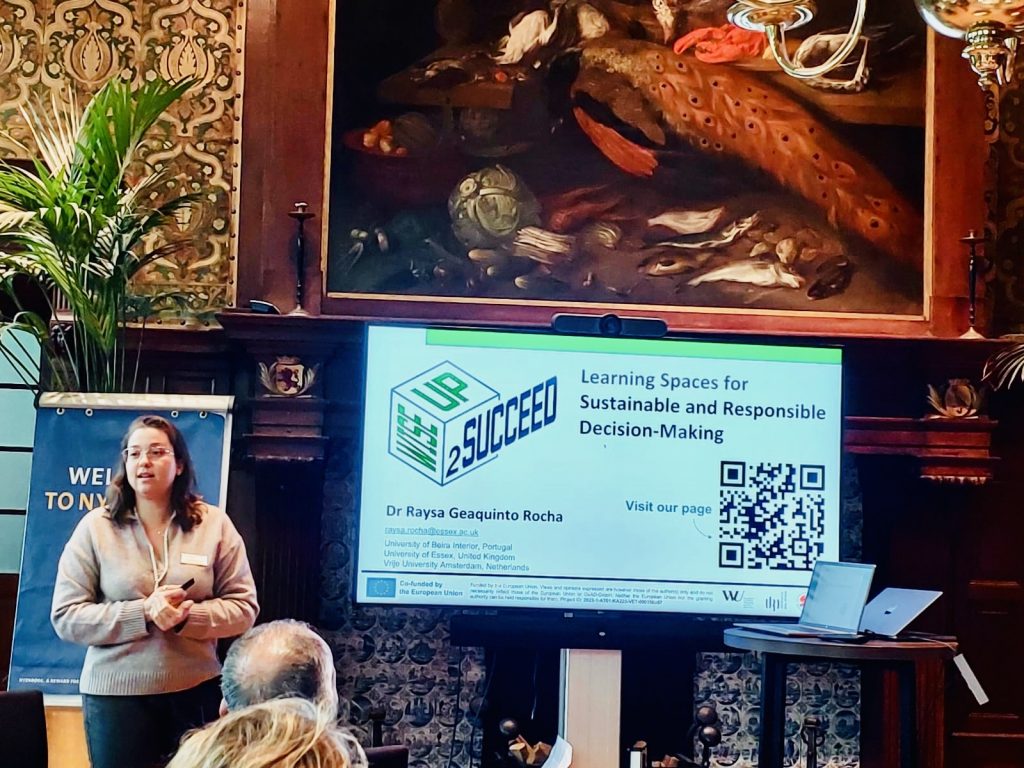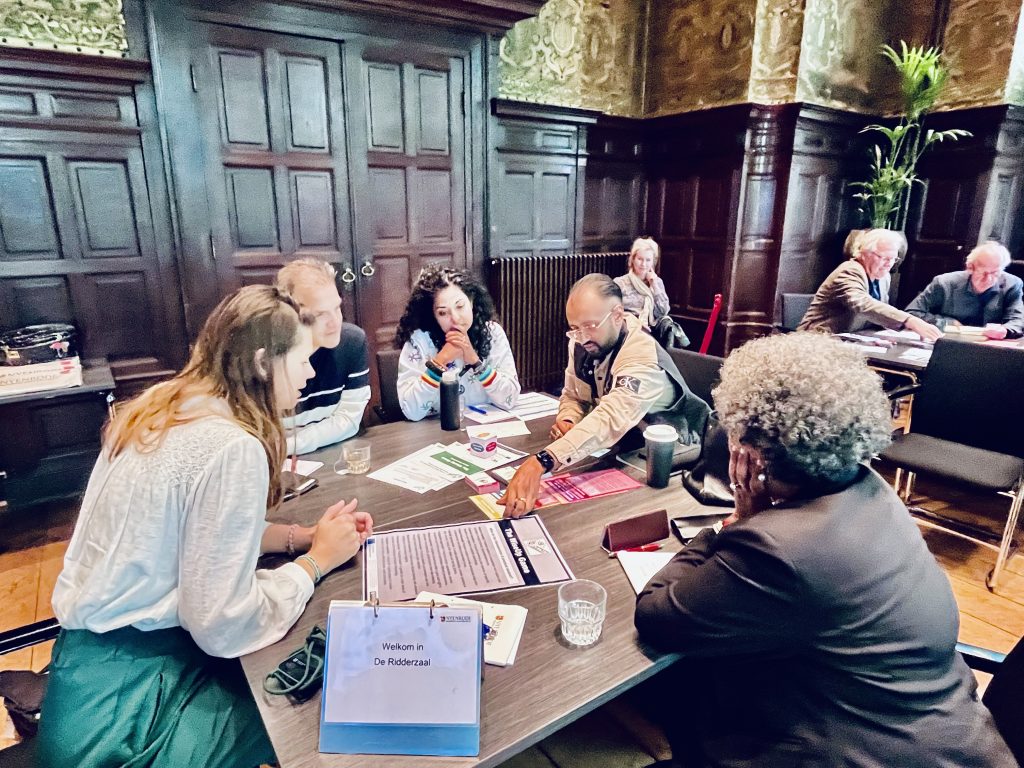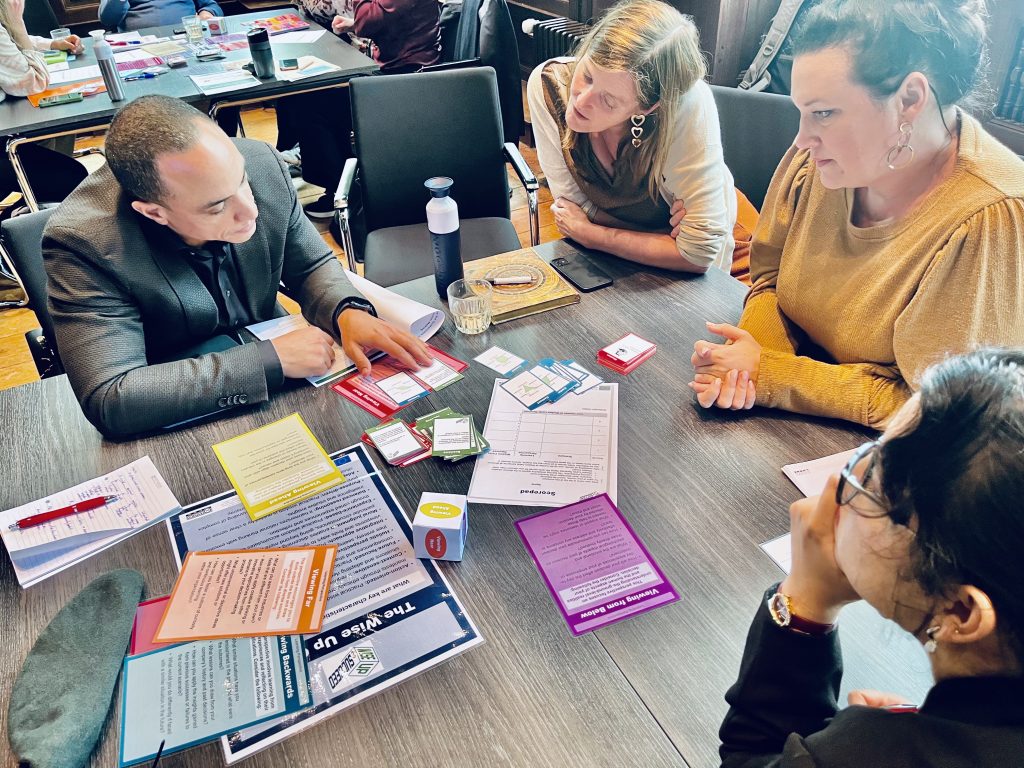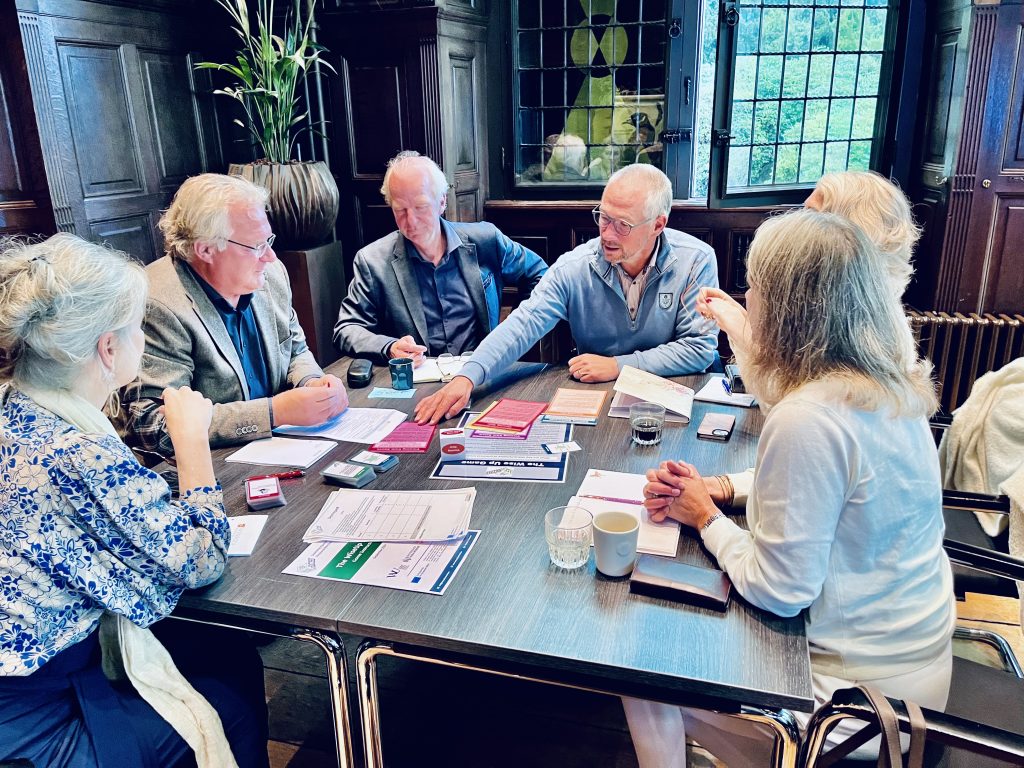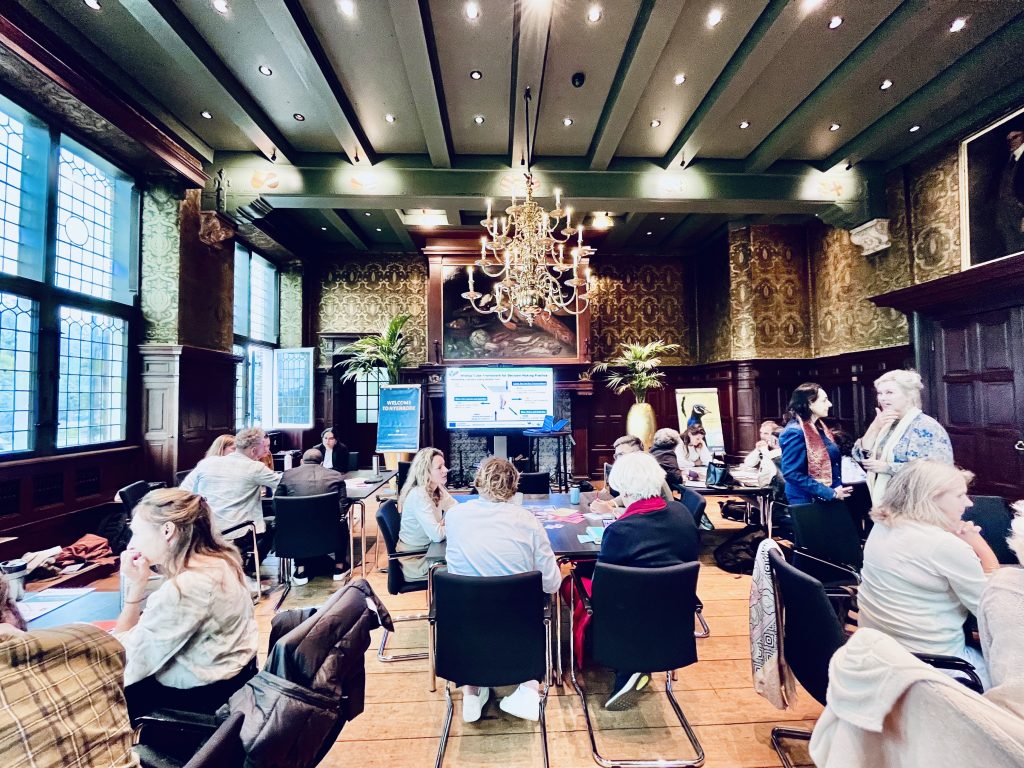News
TH Lübeck Welcomes WiseUp
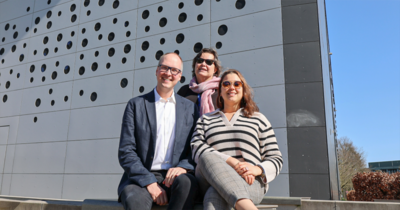
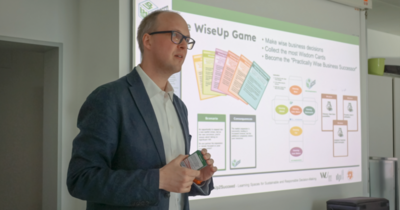
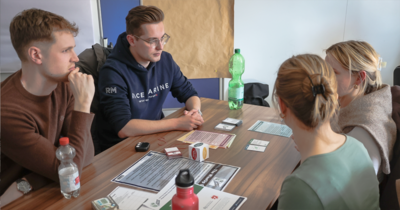
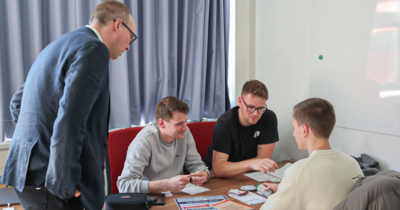
WiseUp Game Workshop at TH Lübeck
Invited by Prof. Desirée Ladwig, Dr. Florian Kragulj and Dr. Raysa Rocha visited Technische Hochschule Lübeck in early April to introduce Business and Electrical Engineering Master Students to the WiseUp project and its educational game.
During practical sessions, students had the opportunity to engage with the WiseUp game firsthand, exploring how gamification can enhance learning and motivation in decision-making within business contexts.
The lively exchange and positive feedback once again highlighted the growing interest in WiseUp and its potential to transform educational practices.
We would like to extend our sincere thanks to Prof. Ladwig and the team at TH Lübeck for the warm welcome and the opportunity to share our project with such engaged students.
For more information, visit the TH Lübeck news article.
Project completion
Feedback from our participants
The project has now come to a successful end, and we’re thrilled to share that the feedback from our participants has been overwhelmingly positive. Here are some of their words we’d like to highlight:
“The project presents a multidimensional systemic approach that provides the participants with deep knowledge.”
“Just the simple fact that it’s a gamification of concepts is a great example of conveying complex concepts to people, regardless of the audience, because you can adjust. You can always tweak it. From that point on, I already think it’s something that can be applied in the classroom. It’s something that can be applied at times when we want to, I don’t know, do team building, even.”
“The WiseUp framework broadened my awareness of diverse perspectives, enabling me to think in a more holistic and comprehensive way.”
“Gamification truly makes it possible to grasp complex concepts. It’s remarkable how a game can simplify the intricacies of decision-making.”
Impact and Recognition


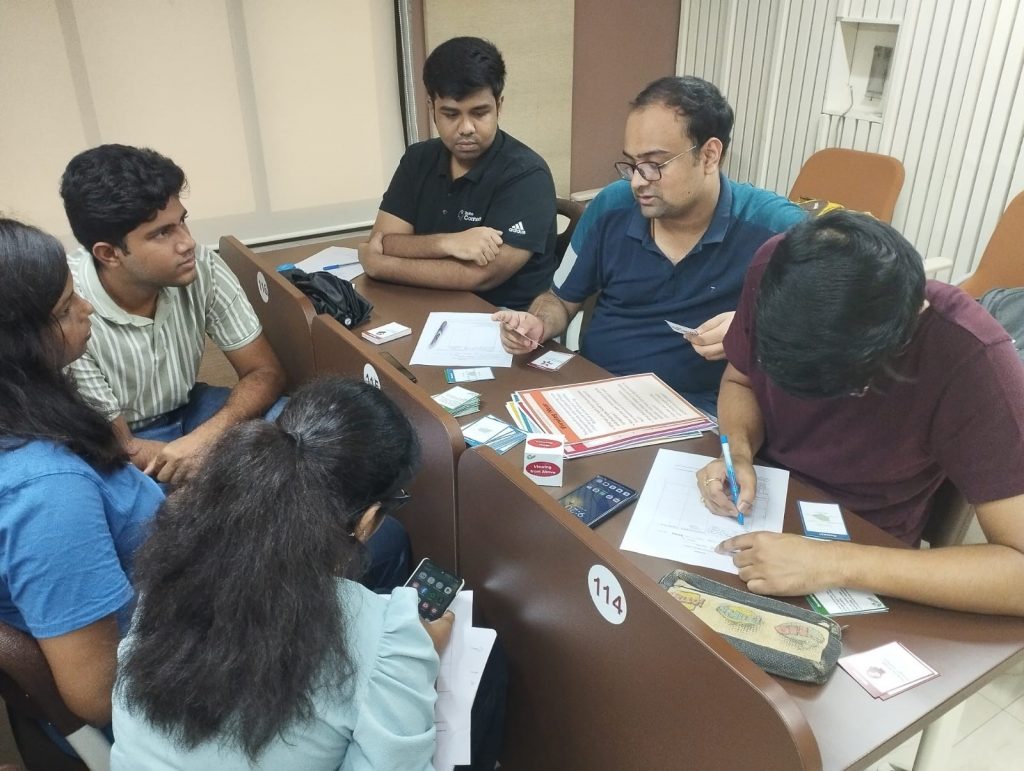
WiseUp Game adopted worldwide
The project’s success has extended beyond European borders, with the Wise Up Game being adopted by prestigious institutions worldwide. Notably, the Indian Institute of Technology, Bombay, has integrated the game into their MBA programs, reaching hundreds of students and demonstrating the tool’s versatility and global applicability.
The Wise Up to Succeed project represents a significant step forward in entrepreneurial education. It combines academic rigour with practical application to foster a new generation of responsible business leaders.
For more information about implementing the Wise Up Game in your institution or participating in our training programs, please get in touch with us: info@wiseup2succeed.eu
Business & Spirituality Symposium
Our project team was honored to participate in the Business & Spirituality Symposium: “Doing Business with the Unknown” on October 1, 2024, at the Nyenrode Business University, Netherlands.
Dr. Raysa Geaquinto Rocha presented “WiseUp Game: A Game-based Learning Framework to Develop Practically Wise Business Successors” as part of the symposium’s focus on Values, Ethics & practical exploration. This presentation showcased how our project has developed innovative tools to integrate practical wisdom into business education and decision-making.
The symposium brought together experts to explore how spirituality can positively impact today’s complex business world. It focused on key aspects of spirituality in business and its role in global risks and sustainability. They engaged in rich discussions on navigating uncertainty, holistic leadership, and integrating diverse ways of knowing into business practices.
Participating in this event aligned closely with our project’s goals of fostering responsible and sustainable decision-making among business leaders. We are happy to see the executives playing the WiseUp Game and further disseminating our project outputs.
We express our sincere gratitude to symposium convenors Prof Sharda Nandram (Nyenrode Business University, Netherlands) and Dr Gunjan Joshi (Vrije Universiteit Amsterdam, Netherlands) for enabling this opportunity and to all symposium participants for their engaging discussions and valuable feedback.
Symposium by the Nova School of Business and Economics in Lisbon
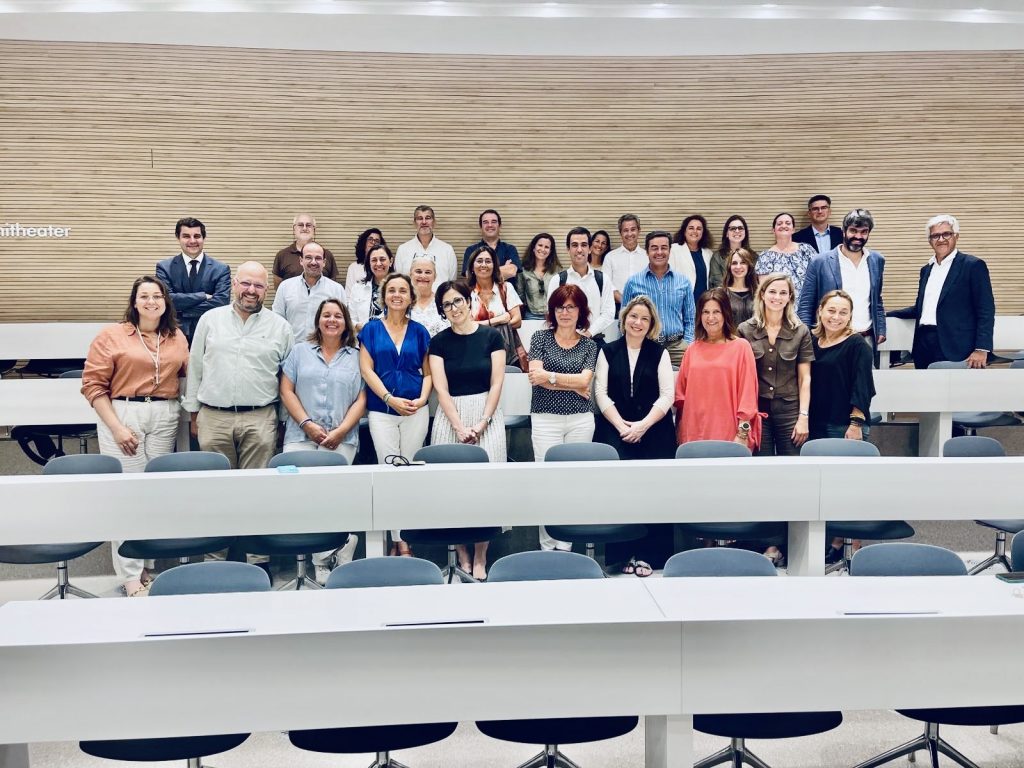
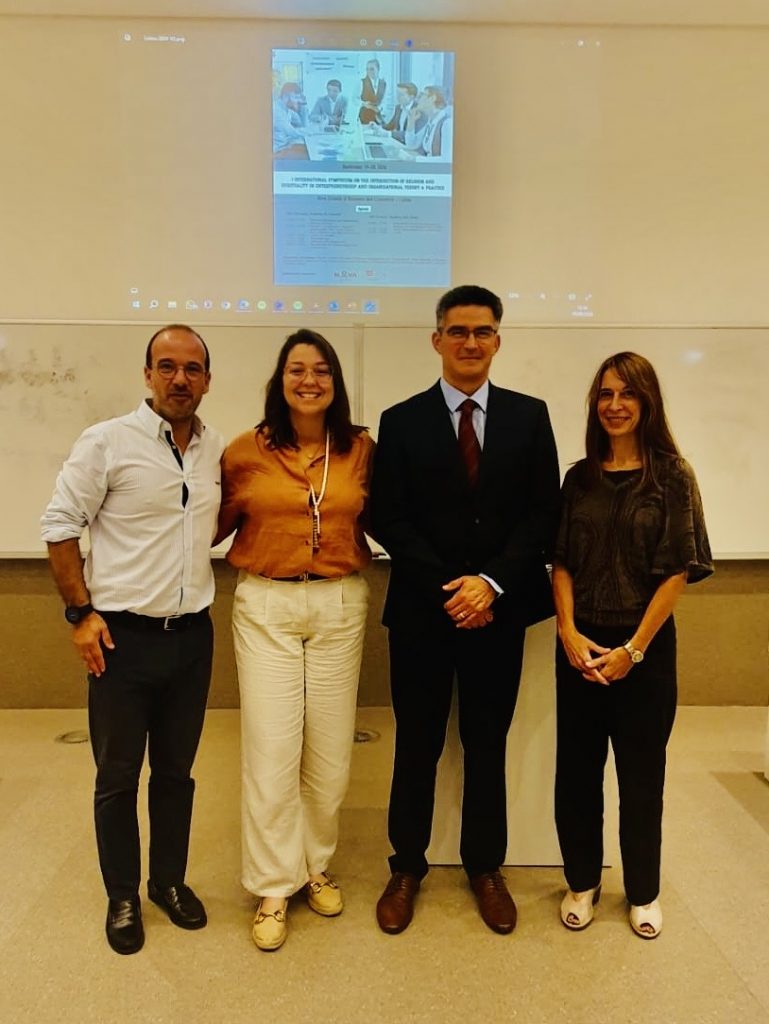
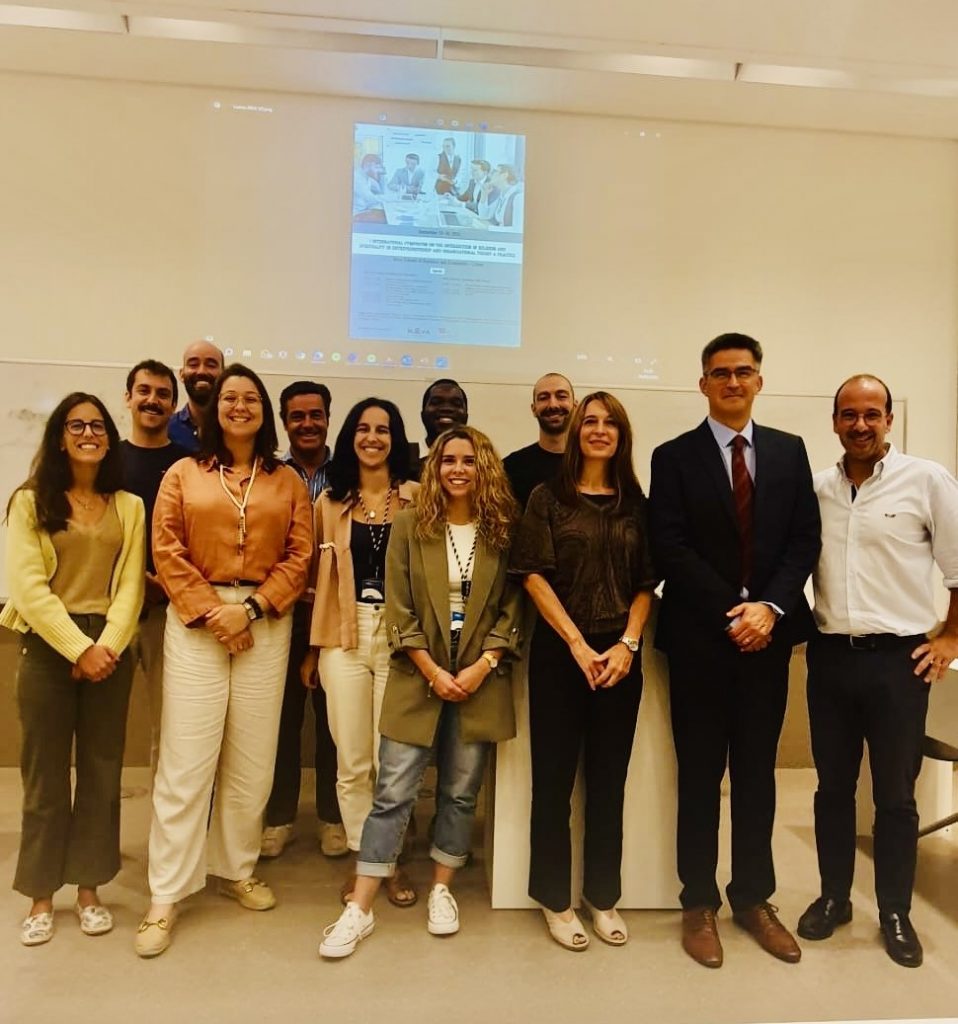
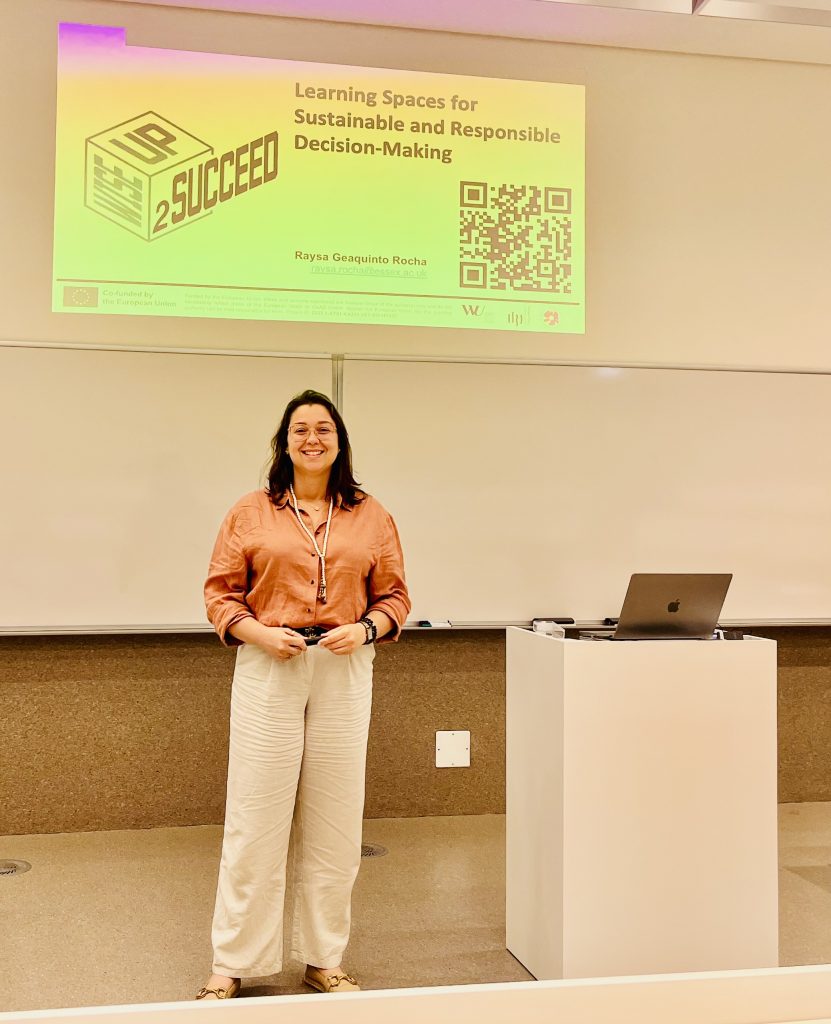
Symposium on Religion, Spirituality and Entrepreneurship
We are pleased to announce that the WiseUp 2 Succeed project was prominently featured at the Symposium on Religion, Spirituality and Entrepreneurship, hosted by the Nova School of Business and Economics in Lisbon on September 19-20, 2024.
Dr. Raysa Geaquinto Rocha, representing our project consortium, had the honour of presenting our innovative research and introducing the Wise Up Game developed as an integral component of the WiseUp 2 Succeed initiative.
This symposium provided an excellent forum to showcase our work on enhancing decision-making competencies for business successors to a distinguished international audience of scholars and entrepreneurs.
Symposium Highlights:
- Presentation of WiseUp 2 Succeed research to Scholars
- Presentation of WiseUp 2 Succeed Game and Learning Platform to entrepreneurs
- Demonstration of the project’s educational tool
- Engagement with leading experts in entrepreneurship and family business studies
We extend our sincere appreciation to symposium convenors Dr Ricardo Zozimo (Nova School of Business and Economics, Portugal) and Dr Nuria Toledano (University of Huelva, Spain) for facilitating this opportunity and to all symposium participants for their engaging discourse and positive feedback.
WiseUp to Succeed Online Closing Event
Zoom Link: https://wu-ac-at.zoom.us/j/67783353042?pwd=vD5NMUMPsRZhviWSnmHNx8DtcRVNnN.1
Agenda: Download here
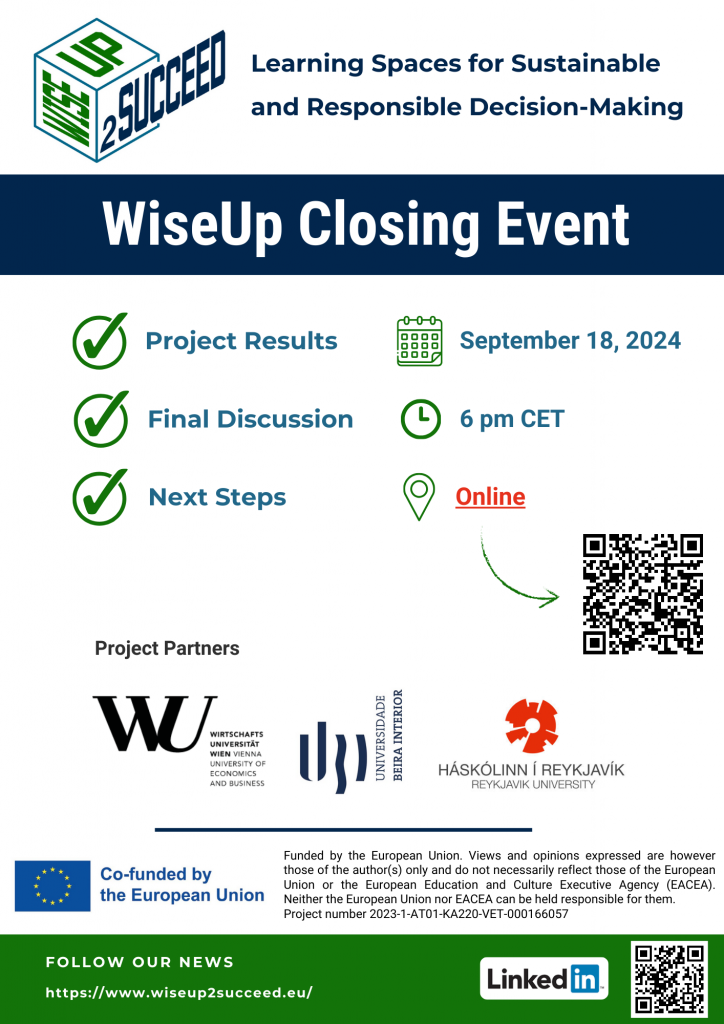
International CSR Conference
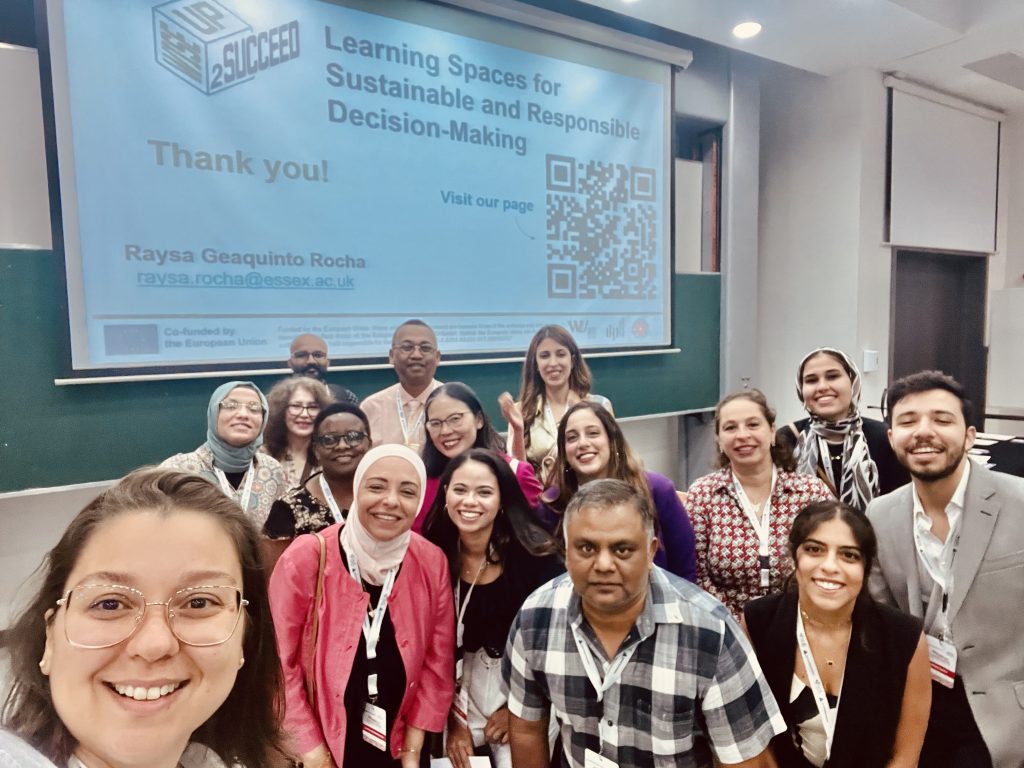
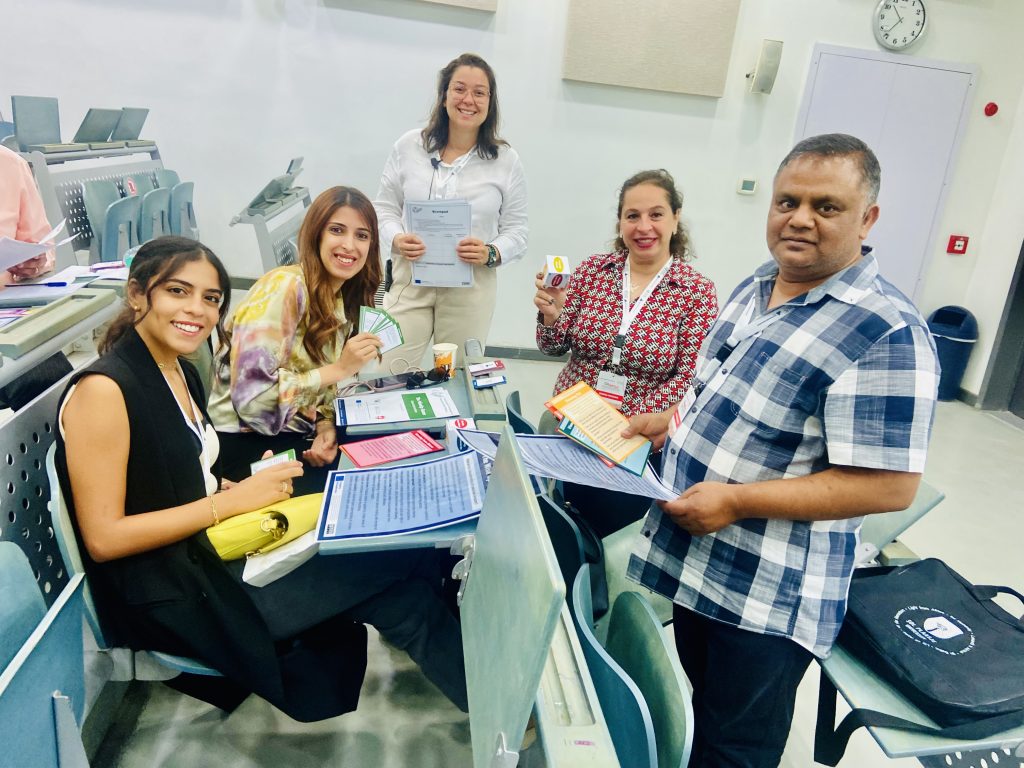
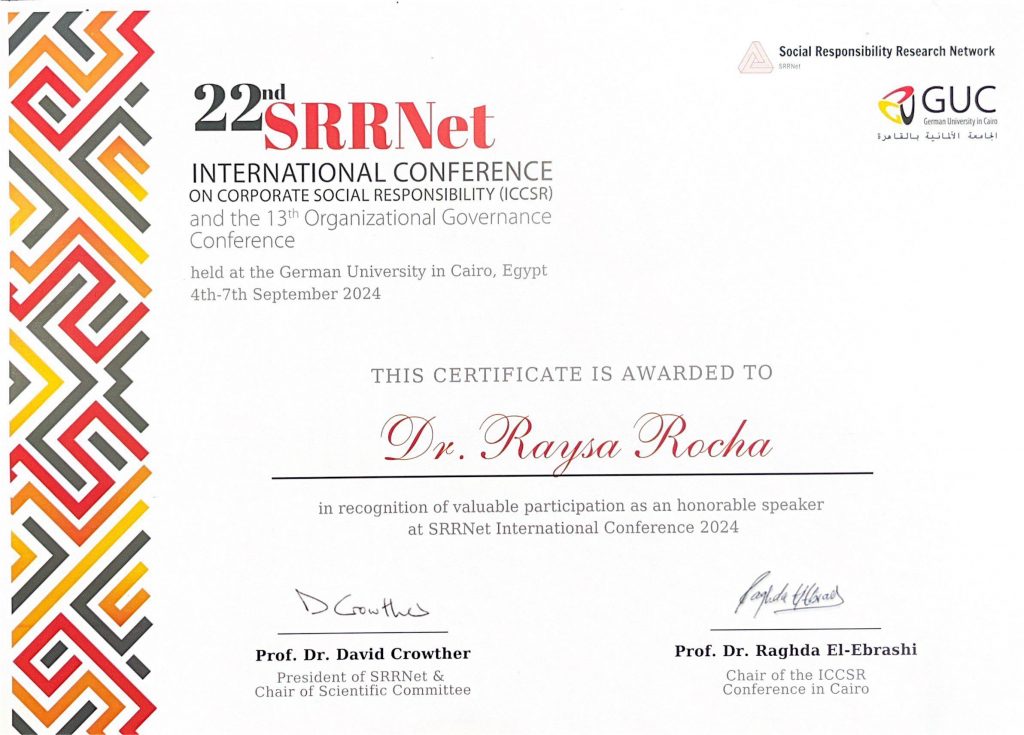
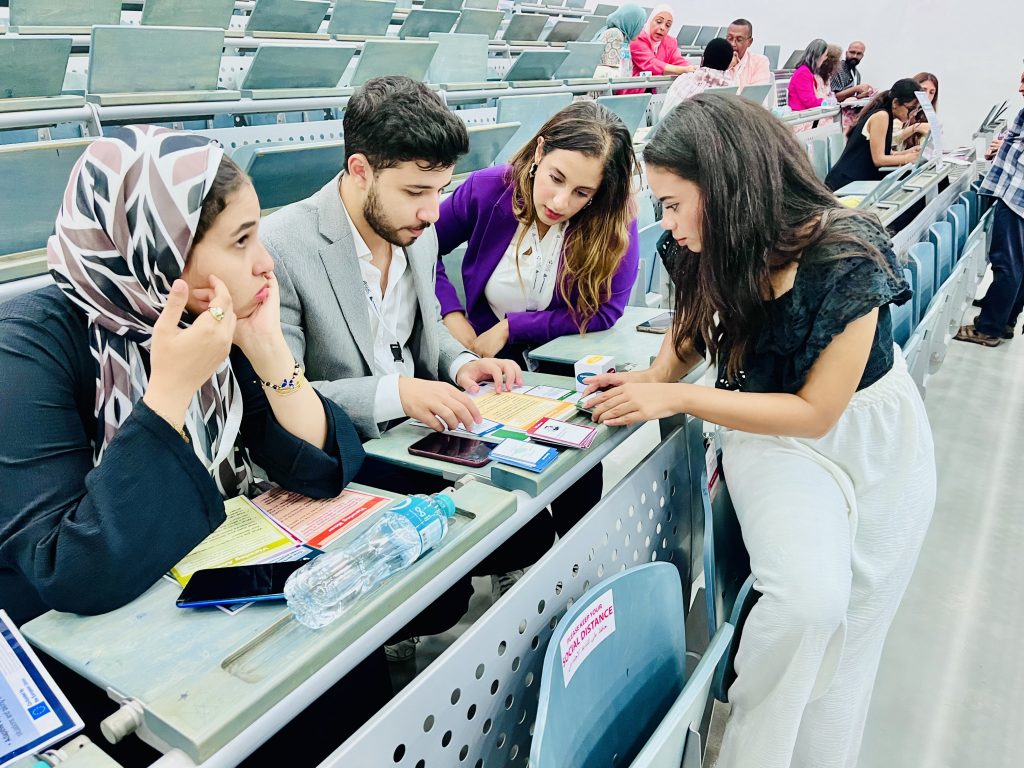
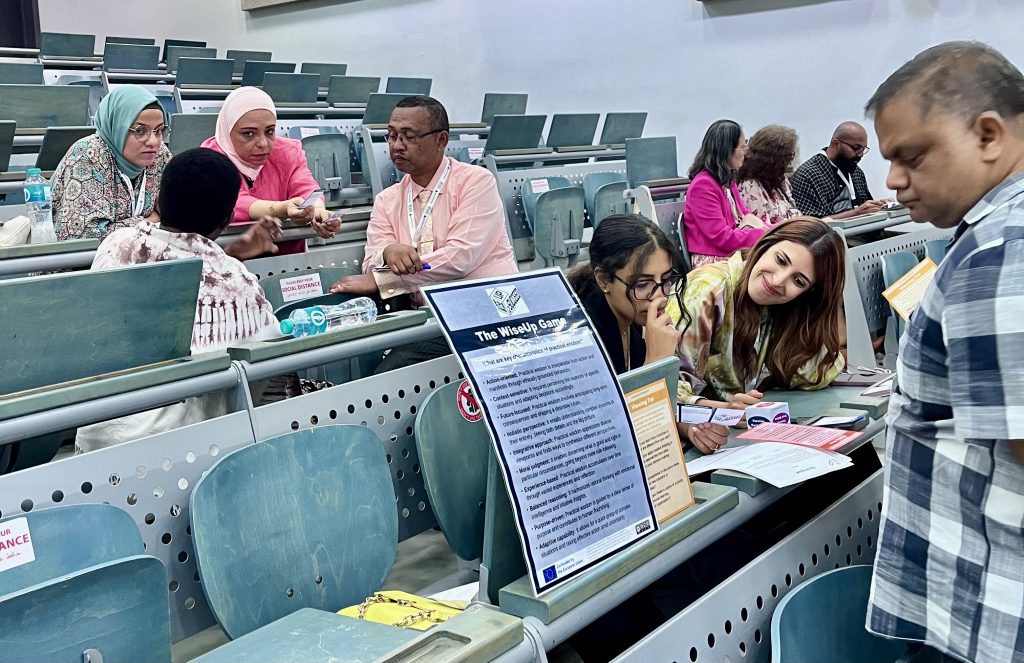
WiseUp 2 Succeed Showcased at International CSR Conference
The WiseUp 2 Succeed project made a splash at the 22nd SRRNet International Conference on Corporate Social Responsibility (ICCSR) held at The German University in Cairo, Egypt. Dr Raysa Rocha presented the project to an audience of international scholars, highlighting its mission to empower business successors with sustainable and responsible decision-making skills.
The highlight of the presentation was a hands-on demonstration of the WiseUp Game, a key component of the project’s learning toolkit. Conference attendees from various countries had the opportunity to play the game and experience firsthand how it teaches the six learning perspectives central to responsible and sustainable decision-making in business succession.
This successful showcase not only spread awareness of the WiseUp 2 Succeed project but also demonstrated the engaging and practical nature of its approach to business education. The diverse group of scholars’ positive reception underscores the project’s impact on fostering responsible business practices across different cultural contexts.
The event marked a valuable step in the project’s journey, bringing its innovative methods for cultivating ethical business practices to a global stage and paving the way for future collaborations and implementations.
Management Revue Journal
Research Publication on Management Revue Journal
We are thrilled to announce that the article “The Impact of Organisational Practical Wisdom and Learning Strategy on Corporate Social Responsibility” has been accepted for publication in the prestigious management revue – Socio-Economic Studies (MREV), an ABS 2 rating in the Academic Journal Guide. It represents a significant contribution to the field of management and sustainability.
This study, co-authored by WiseUp project members Dr Florian Kragulj and Dr Raysa Rocha, their former student Sophia Mayrhofer at WU Vienna University of Economics and Business, and Prof Marcia d’Angelo, Fucape Business School, provides empirical evidence for the positive impact of organizational practical wisdom on corporate social responsibility performance in Austrian business. This research was valuable in shaping the WiseUp project’s application design and conceptual framework. The findings highlighted the importance of integrating knowledge management practices and value-based approaches in fostering responsible decision-making.
The research highlights the crucial role of practical wisdom in promoting socially responsible practices in businesses, demonstrating how it can enhance an organization’s ability to navigate complex societal challenges while achieving economic goals. Additionally, the study explores the influence of learning strategies on developing organizational practical wisdom.
This publication in Management Revue, a well-respected journal in the field, underscores the relevance and quality of the research conducted by the WiseUp project partners. It also reflects our commitment to advancing knowledge that can drive sustainable and responsible business practices.
We congratulate the authors on this achievement and look forward to sharing more insights from this important work as we continue our mission to promote sustainable and responsible decision-making in business.
Citation: Kragulj, F., Mayrhofer, S., Rocha, R. G. & d’Angelo, M. J. (2024) Organisational Phronesis on Corporate Social Responsibility Performance and Learning Strategy. Management Revue – Socio-Economic Studies. Ahead-of-print.
Social Responsibility Journal
Research Publication in Social Responsibility Journal
We are overjoyed to announce that the article “Doing well by doing right: Where is practical wisdom in business?” has been published in the prestigious Social Responsibility Journal, CiteScore on Scopus of 7.3, in 2023, a 5-year Impact Factor of 4 on Clarivate Analytics, and an ABS 1 rating in the Academic Journal Guide. It particularly contributes to organizational behavior, sustainability, and business ethics.
This study, co-authored by WiseUp project members Dr Raysa Rocha, Prof Paulo Pinheiro, and Dr Florian Kragulj and her co-authors, provides empirical evidence for the positive impact of organizational spirituality and knowledge sharing on organizational practical wisdom in business. The research findings directly informed the project’s design of a blended learning curriculum that combines technical knowledge with ethical considerations and reflective practices, aiming to cultivate practically wise entrepreneurs capable of navigating complex societal challenges while pursuing responsible and sustainable business practices.
The research highlights the crucial role of spirituality and knowledge sharing in promoting practically wise decision-making in businesses. It demonstrates how these factors can enhance an organization’s ability to navigate complex societal challenges while achieving economic goals and contributing to the common good. The study also explores the impact of organizational spirituality in the interplay between knowledge sharing and organizational practical wisdom.
This publication in the Social Responsibility Journal, a well-respected outlet in the field, underscores the relevance and quality of the research conducted by the WiseUp project partners. It also reflects our commitment to advancing knowledge that can drive sustainable and responsible business practices.
We congratulate the authors on this achievement and look forward to sharing more insights from this important work as we continue our mission to promote sustainable and responsible decision-making in business.
See the full paper here: https://www.emerald.com/insight/content/doi/10.1108/SRJ-11-2023-0627/full/html
Citation: Rocha, R.G., Pinheiro, P.G., Kragulj, F., Nunes, C. and d’Angelo, M.J. (2024), Doing well by doing right: where is practical wisdom in business?, Social Responsibility Journal, Ahead-of-print. https://doi.org/10.1108/SRJ-11-2023-0627
Center for Practical Wisdom – University of Chicago
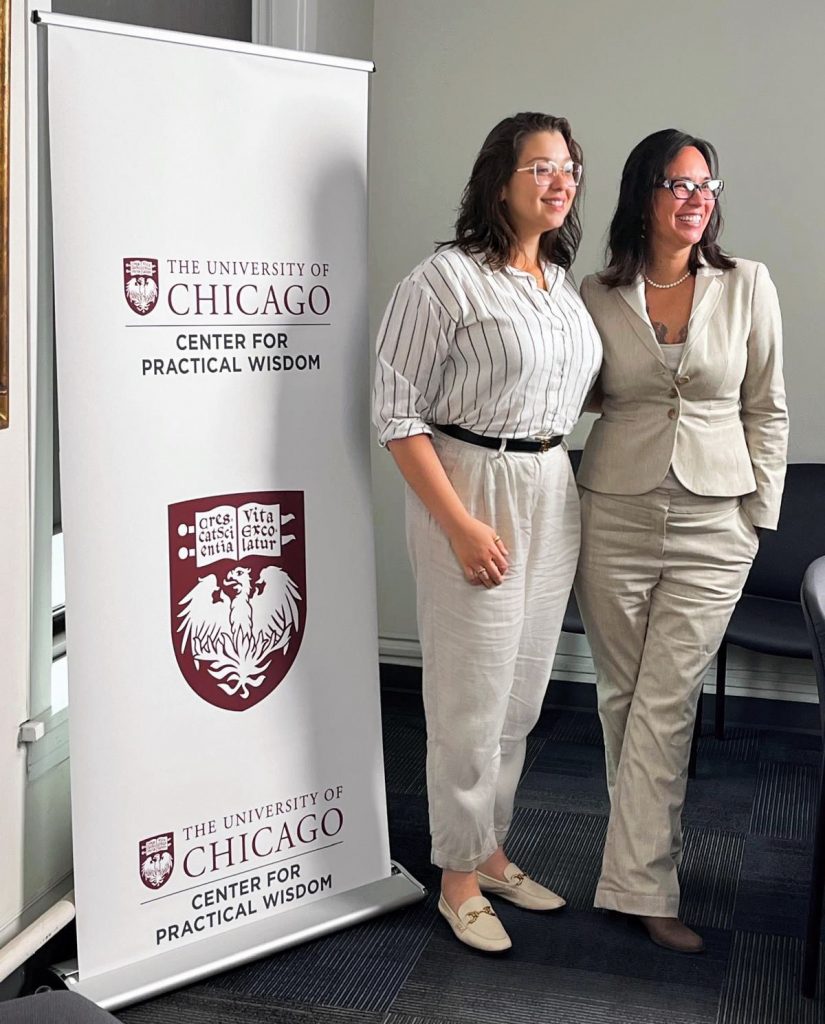
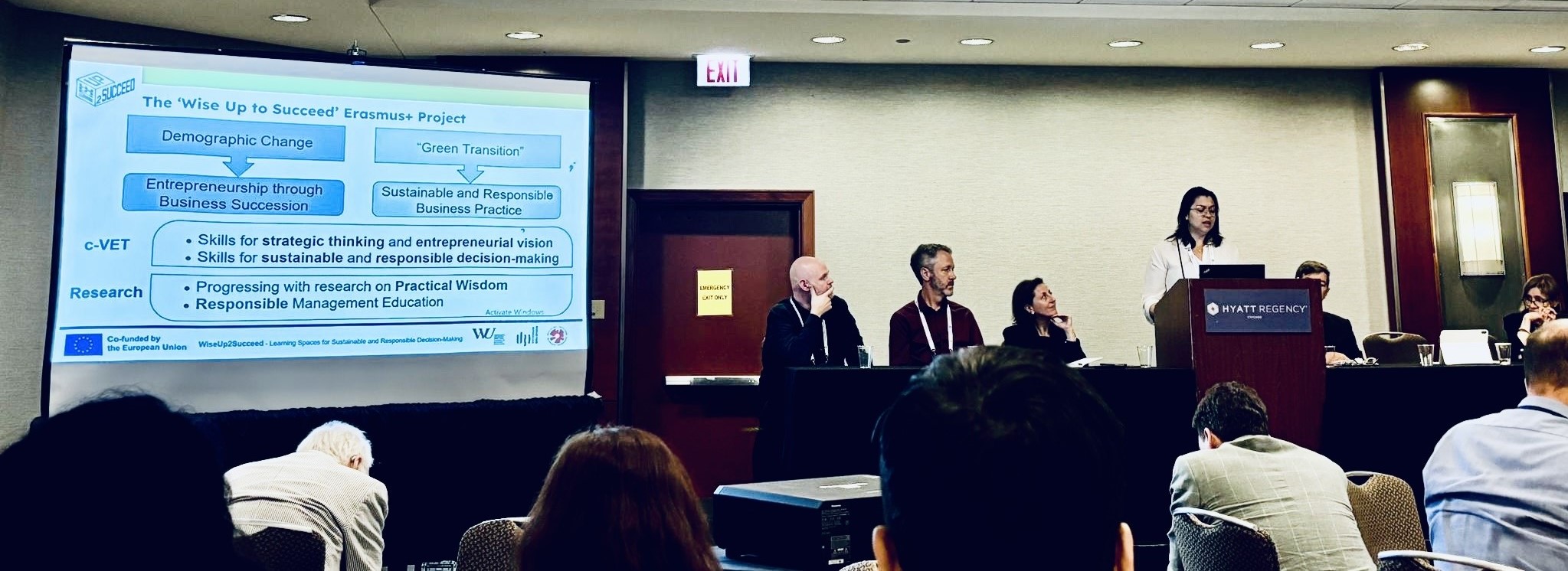
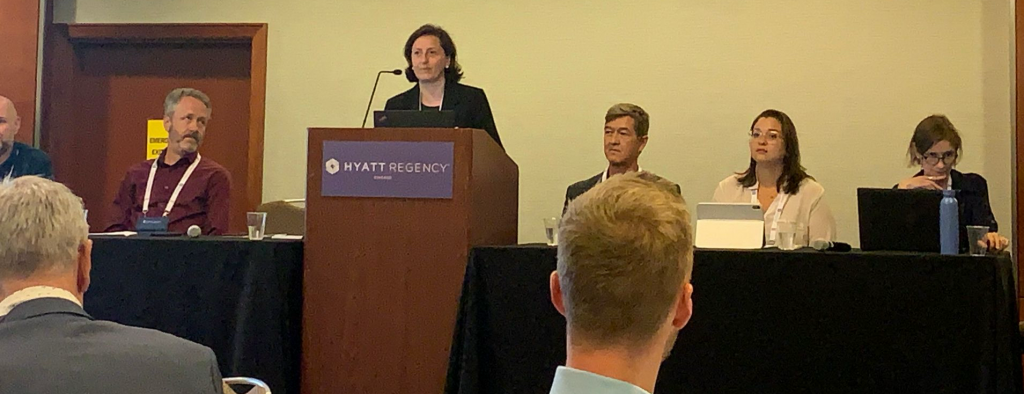
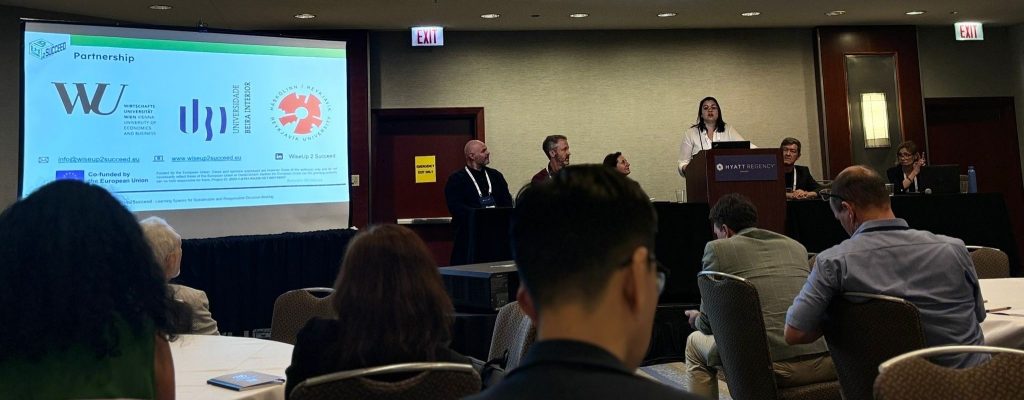
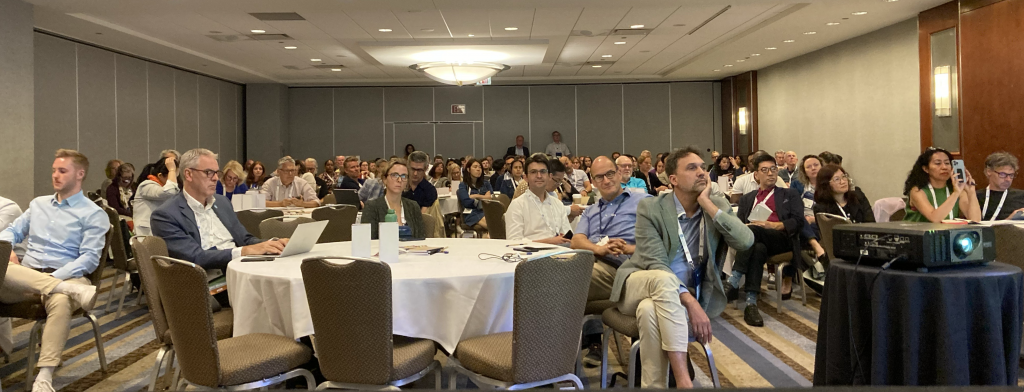
WiseUp Project: Exploring Practical Wisdom in Chicago
We are delighted to share an exciting update from our recent academic endeavors in Chicago, where the WiseUp 2 Succeed project made significant strides in advancing the discourse on practical wisdom in business succession.
Center for Practical Wisdom – University of Chicago
Dr Raysa Rocha had the privilege of engaging in a highly productive dialogue at the prestigious Center for Practical Wisdom at the University of Chicago. The stimulating conversation centered around practical wisdom and the innovative WiseUp Game, a key output of our WiseUp 2 Succeed project. We extend our heartfelt gratitude to our host, Jean Matelski Boulware.
Academy of Management Presentation
In addition to our collaborative efforts, Dr Rocha had the honor of presenting the WiseUp 2 Succeed Project and the WiseUp Game at the Academy of Management’s “Innovation in Leadership Development for Human Flourishing” session. This platform provided an invaluable opportunity to showcase our work to a diverse audience of scholars and practitioners.
We extend our sincere appreciation to Professor Elena P. Antonacopoulou, Gnosis Institue, for organizing this inspiring session and to all participants for their insightful contributions and enthusiasm.
The WiseUp Game, designed to cultivate practical wisdom in business succession, garnered significant interest for its innovative approach to fostering sustainable and responsible decision-making skills. The positive reception and engaging discussions that followed have further supported the relevance and potential of our project in the academic and professional spheres.
EURAM 2024
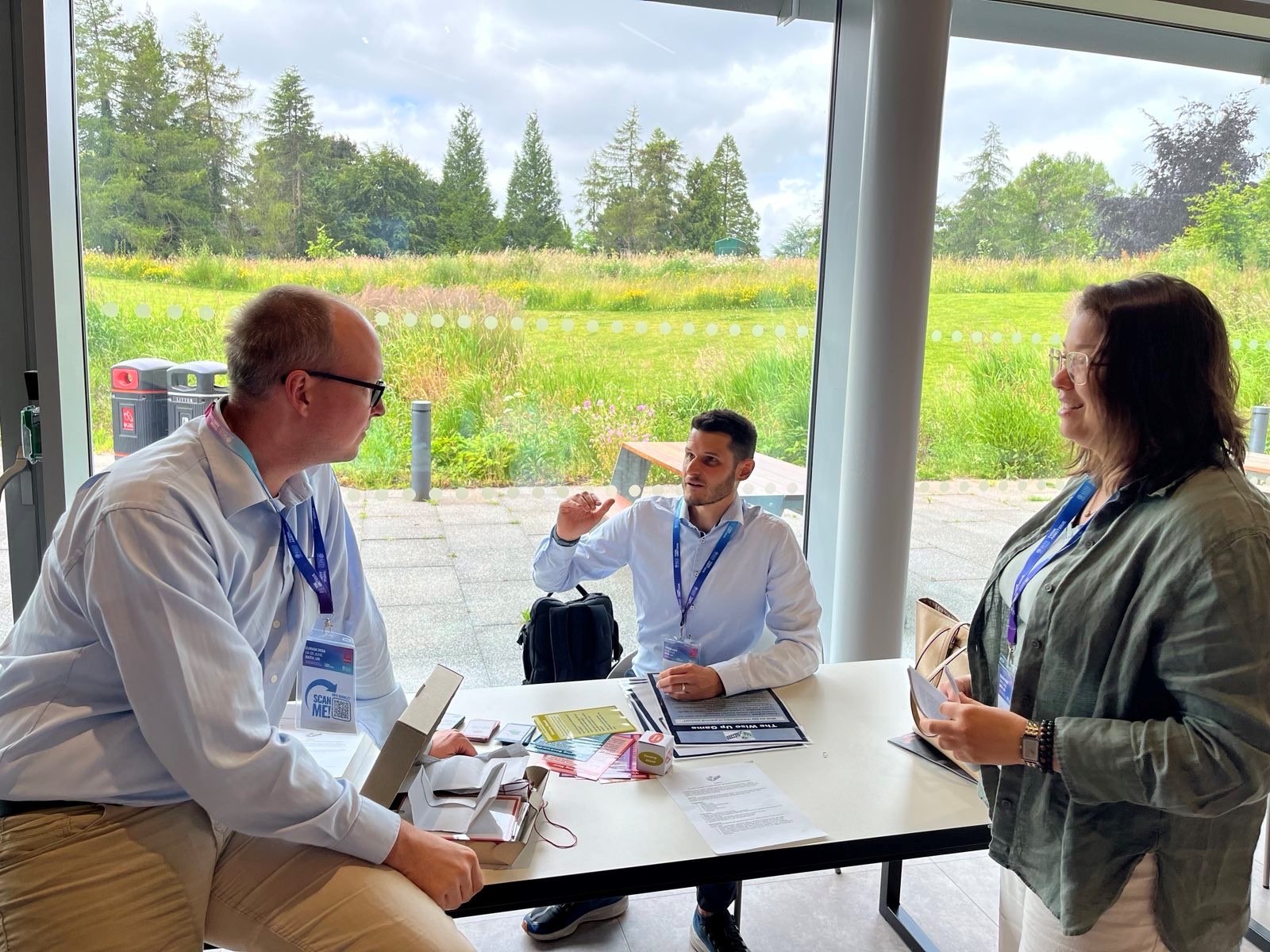
Wiseup 2 Succeed Game analyzed by Gamification Specialist
We were honoured to have Dr. Max Monauni, Lucerne University of Applied Sciences and Arts, a renowned gamification specialist, evaluate the WiseUp Game at the EURAM 2024 conference in Bath on June 27, 2024. Dr. Monauni’s insights were invaluable, offering a wealth of knowledge from years of experience designing educational games.
His astute observations highlighted both the strengths of our current design and areas with potential for enhancement. We are particularly grateful for Dr. Monauni’s suggestions on improving player engagement and aligning game mechanics more closely with our learning objectives around practical wisdom in business succession.
We extend our sincere thanks to Dr. Monauni for dedicating his time and expertise to the WiseUp2Succeed project. His contribution marks an important milestone in our game’s development.
EURAM 2024
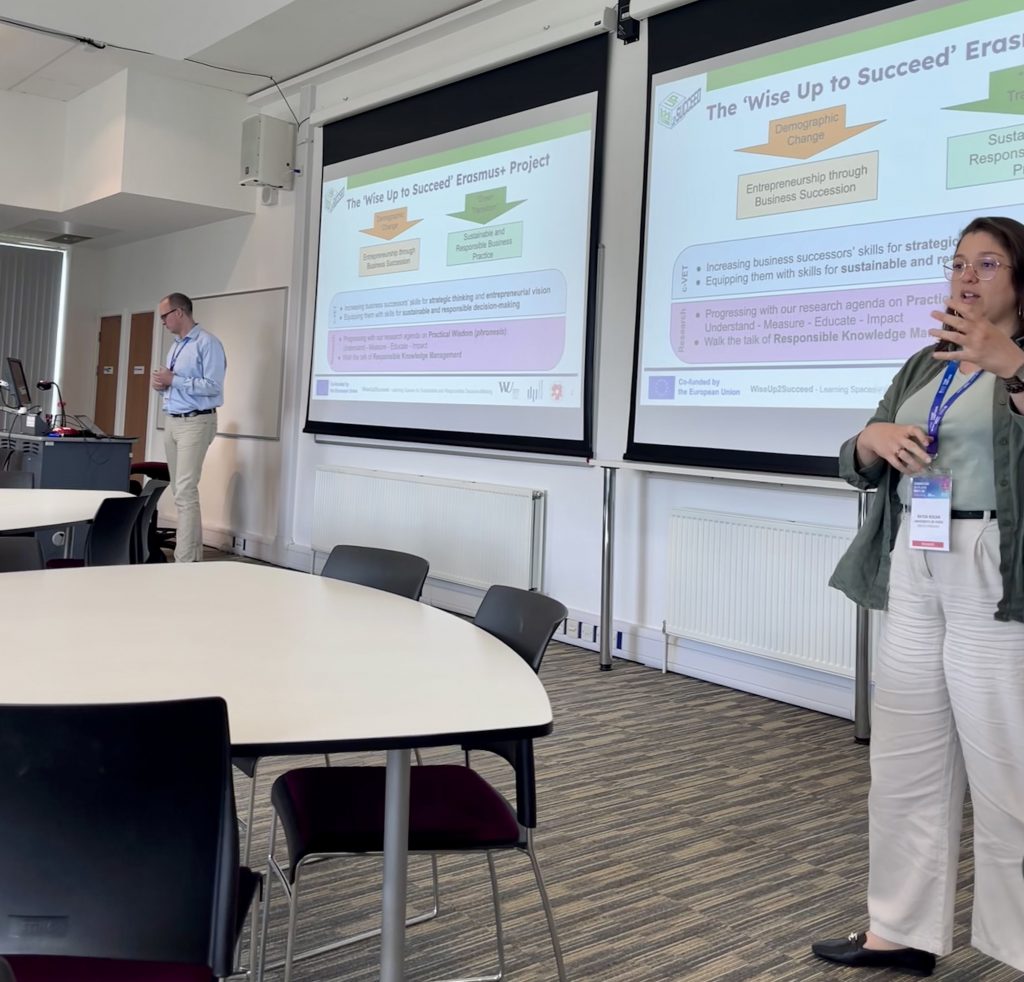
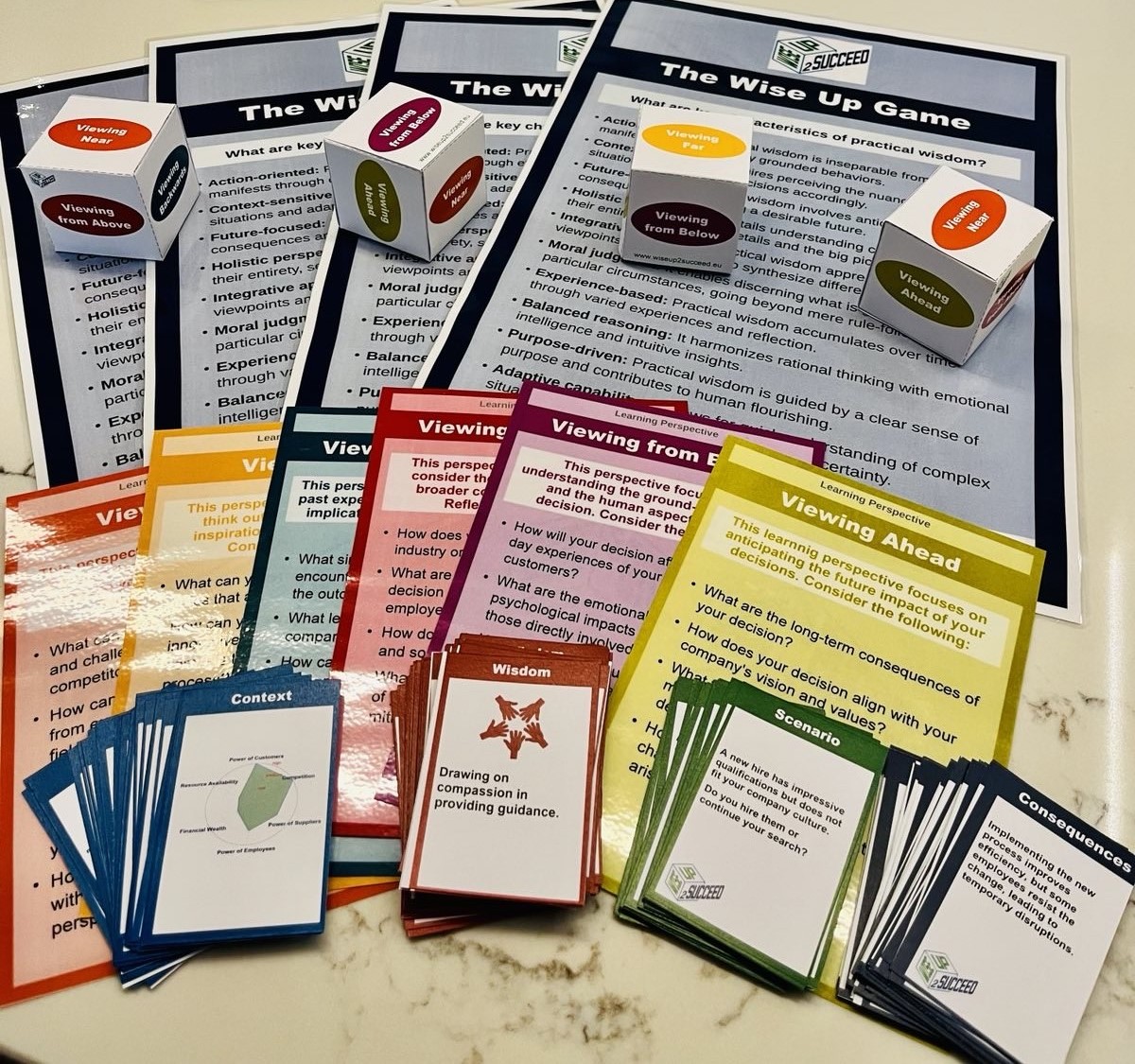
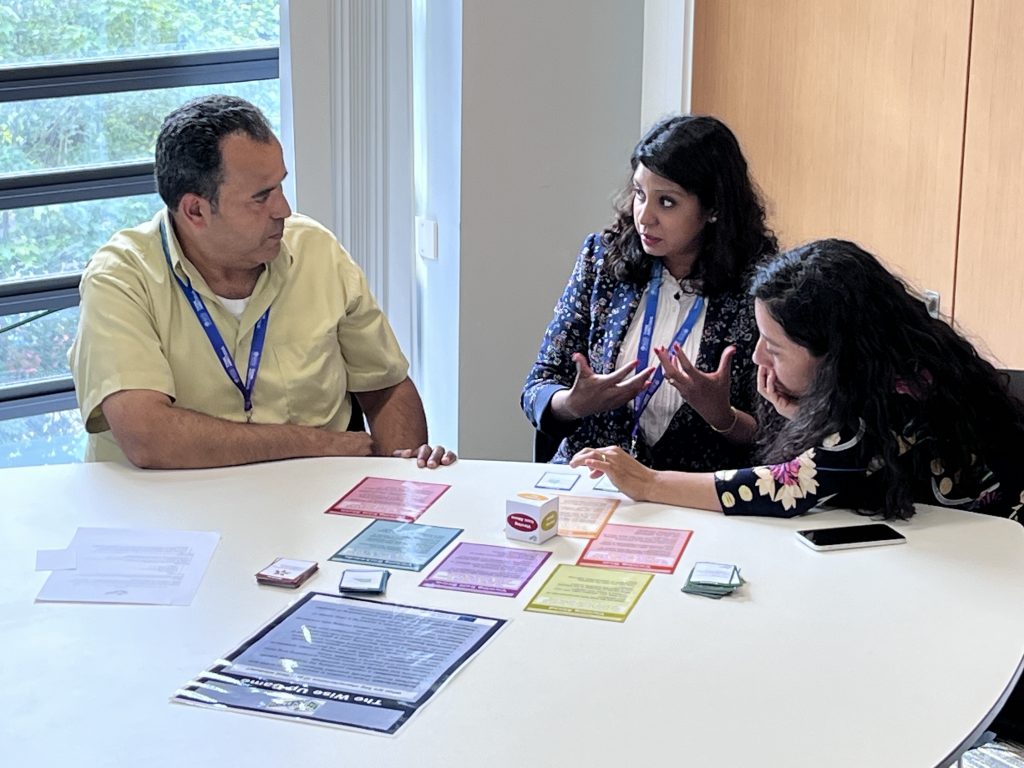
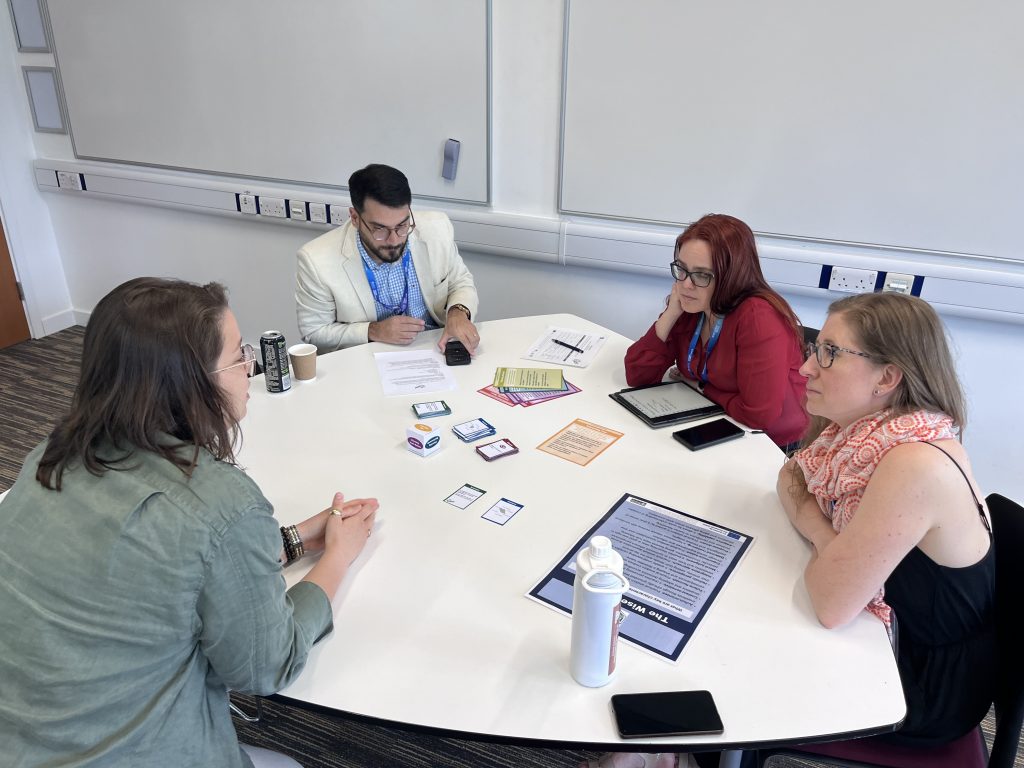
The WiseUp 2 Succeed Symposium was a success!
The WiseUp 2 Succeed Symposium at EURAM 2024 in Bath was a resounding success, drawing participants from 10 countries across Europe and beyond. The event brought together a diverse group of academics and entrepreneurs with over a decade of experience in their respective fields. This unique blend of theoretical knowledge and practical expertise created a rich environment for exploring the intricacies of practical wisdom in business succession. The symposium showcased the innovative WiseUp game, designed to foster decision-making skills grounded in practical wisdom principles.
Participants eagerly engaged with the game, navigating complex business scenarios and applying multifaceted decision-making strategies. The interactive nature of the WiseUp game sparked lively discussions and debates, highlighting the diverse approaches to practical wisdom across different cultures and industries. Feedback from attendees was overwhelmingly positive, with many expressing how the game provided fresh insights into their own decision-making processes and offered new perspectives on addressing business challenges. The symposium’s success advocates for the effectiveness of the WiseUp game as an educational tool and underscored the growing importance of practical wisdom in today’s dynamic business landscape.
EURAM 2024
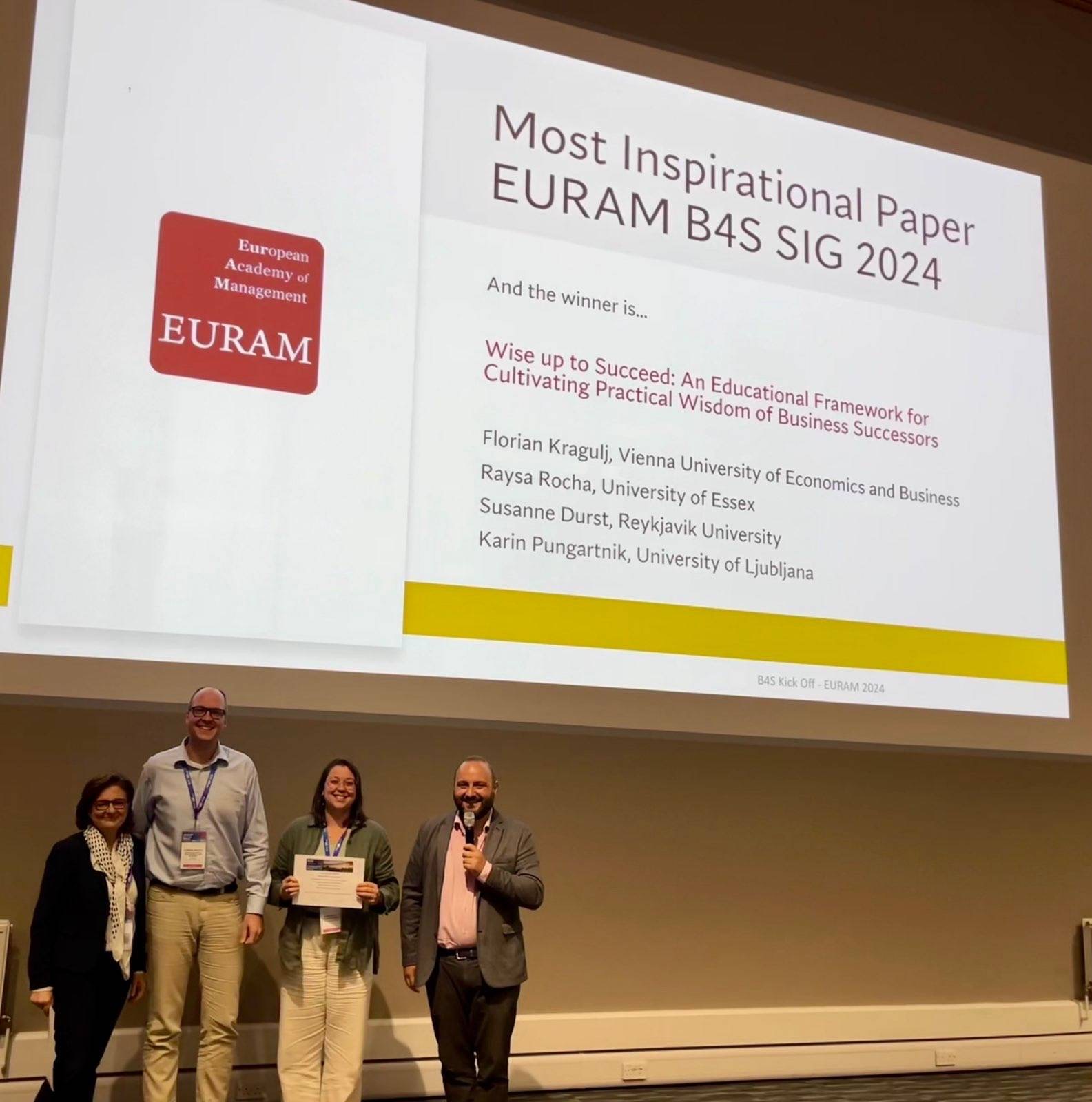
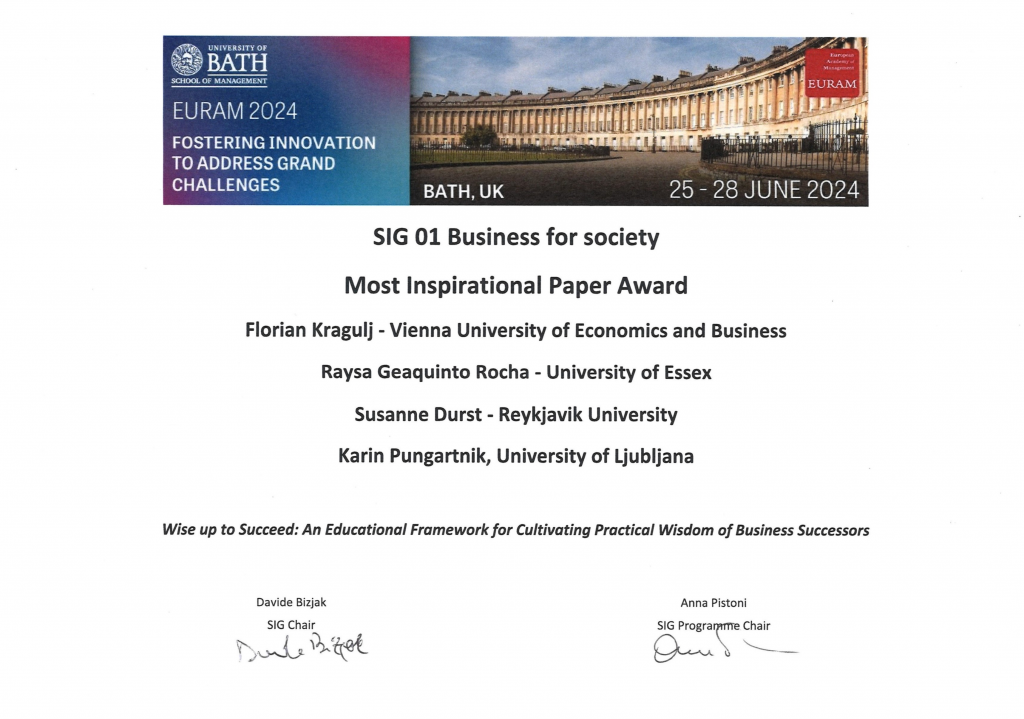
WiseUp 2 Succeed: Pioneering Practical Wisdom in Business Education
The EURAM 2024 conference in Bath marked a significant achievement for the WiseUp 2 Succeed project. For its study, “Wise up to Succeed: An Educational Framework for Cultivating Practical Wisdom of Business Successors,” the project team won the Most Inspirational Paper Award in the Business for Society Strategic Interest Group. This award highlights the project’s innovative approach to nurturing practical wisdom in future business leaders and successors.
The study, led by Florian Kragulj and co-authored by an international team including Raysa Geaquinto Rocha, Susanne Durst, and Karin Pungartnik, demonstrates the project’s dedication to preparing the next generation of business leaders with the skills needed to navigate modern, complex business environments. The award confirms the significance of the WiseUp 2 Succeed project and emphasizes the growing importance of integrating practical wisdom into business education. As the project continues to develop, its impact on responsible management education and business succession strategies holds promise for shaping the future of leadership development in the global business community.
Presentation at EURAM 2024

Wise up to Succeed: An Educational Framework for Cultivating Practical Wisdom of Business Successors
We are enthusiastic to share that the literature review conducted as part of Working Package 2 of our project has been accepted for presentation at the esteemed European Academy of Management conference (EURAM 2024).
The article, titled “Wise up to Succeed: An Educational Framework for Cultivating Practical Wisdom of Business Successors,” represents a significant milestone in our project’s progress. This conceptual study lays the foundation for developing a comprehensive educational framework that aims to cultivate practical wisdom among the next generation of business leaders. By presenting our findings at the EURAM conference, we will have the opportunity to engage with leading scholars and practitioners in the field, exchange ideas, and gather valuable feedback to further refine our approach. See the abstract below:
Abstract: To tackle grand societal challenges and make decisions that serve the common good, we need well educated business successors who will become the practically wise entrepreneurs of tomorrow. This paper presents a pioneering educational framework, i.e., the WiseUp Cube framework, to enhance the decision-making skills of business successors through the cultivation of practical wisdom (phronesis). Emphasising practical wisdom as central to sustainable and responsible decision-making, the study provides a novel perspective for contemporary entrepreneurial education. It addresses a critical gap in management and entrepreneurship education literature by focusing on business successors, an often-neglected target group, whose training and education are pivotal for sustainable business practices. The educational framework targets six practical wisdom skills for critical decision-making. It integrates pedagogical, psychological and philosophical aspects and offers six learning perspectives to enhance these skills. In addition, pedagogical tools for implementing the learning perspectives are named. The study contributes to the advancement of entrepreneurial education. It extends the Responsible Management Education agenda to Vocational Education and Training (VET), an area that has received too little attention in this respect, but which offers immense potential for tackling grand challenges. Moreover, it pioneers the translation of the conceptual understanding of the Aristotelian notion of phronesis into a practical framework for education. It serves as a valuable template for educators involved in the training of business successors and offers guidance for the design of curricula and educational practices targeting this distinct cohort.
Keywords: Practical wisdom, vocational education, successors, entrepreneurs, transformational learning, critical pedagogy
The symposium explores an innovative approach to develop practical knowledge for improved decision-making among successors of European SMEs. It will include a presentation, an immersive gaming experience using cards and a cube, and a dynamic discussion.
The presentation will emphasize the role of practical wisdom on successors of SMEs and their challenges. The gaming activity will give participants first-hand insights into applying practical wisdom to different SME succession scenarios.
The discussion will explore the transformative potential of this novel gaming approach to other areas. It will empower participants with a practical approach to teaching practical wisdom to future SMEs leaders.
Proponents: Raysa Rocha, University of Essex; Florian Kragulj, Vienna University of Economics and Business; Susanne Durst, Reykjavik University
Journal of Innovation Management’s LinkedIn Post
The OECD’s Report “Entrepreneurship in Education: What, Why, When, How – Entrepreneurship360 Background Paper” (Bartin Lackéus, 2015, https://lnkd.in/guiST85z) cited that, ‘The idea of infusing #entrepreneurship into education has spurred much enthusiasm in the last few decades.’ It goes on to state in section 2.1 30. that, The most common reason that #researchers and experts promote entrepreneurial education is that entrepreneurship is seen as a major engine for #economicgrowth and #jobcreation (Wong et al., 2005).’ Over time the OECD has produced various reports on this important topic. More recently, (published July 4, 2022), the European Commission (EC) and the OECD have developed the HEInnovate Guiding Framework to promote innovation and entrepreneurship in higher education and provide guidance to policy makers and Higher Education Institutions (HEIs) that want to generate additional societal and economic value. https://lnkd.in/gkre7pfT
The Journal of Innovation Management is pleased to continue to add to the #Entrepreneurship #Education debate in a recently published paper (July, 2023) by Julien DE FREYMAN, Ph.D. and Susanne Durst which argues that: ‘Most of the entrepreneurship education (EE) efforts have been directed to #businesscreation as the preferred option for entrepreneurial activity. Considering the ever-increasing number of businesses to be transferred and thus the need for people who are willing and interested in seeing a #business transfer as a career option, this one-sided view is unsatisfactory. Inspired by the “attention-interest-desire-action” model from marketing, this paper brings together the existing literature and the authors’ own #research and # experience to propose research directions that can lay the #theoreticalfoundation to incorporate business transfers more clearly in EE. This underlines that #valuecreation through entrepreneurship can take different forms and adds a missing but relevant part to RE and its development.’. Read the full paper via the JIM website: https://lnkd.in/gwv7J6yA
Kick-off Meeting
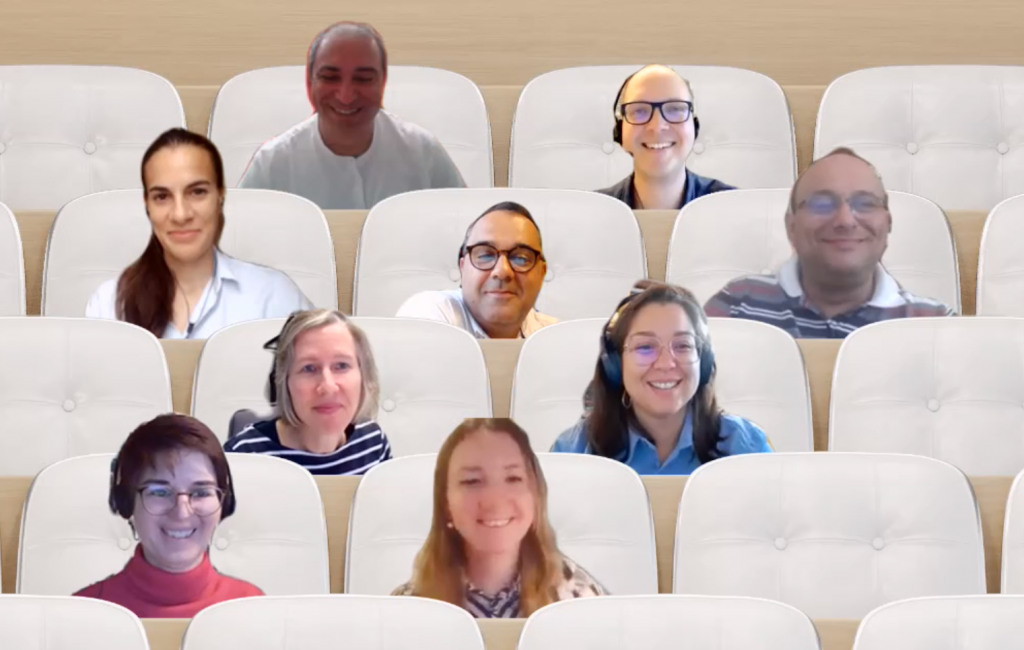
The Wise Up to Succeed Erasmus+ Project has started
The Wise Up 2 Succeed: Learning Spaces for Sustainable and Responsible Decision-Making (2023-1-AT01-KA220-VET-000166057) is on a mission to address two significant European challenges.
Firstly, the project is committed to reigniting the spark of entrepreneurship in the face of demographic shifts and declining business succession. Secondly, it aims to cultivate the wisdom and responsibility of future business leaders.
On October 10, the kick-off meeting for the Wise Up 2 Succeed project was held via Microsoft Teams. During the meeting, the partners discussed the project’s guiding document, which detailed the milestones, timelines, and responsibilities.
The project is being led by Dr Florian Kragulj from the Vienna University of Economics and Business, Austria, and is a collaborative effort with Dr Raysa Rocha and Prof Paulo Pinheiro from the University of Beira Interior, Portugal, as well as Prof Susanne Durst from Reykjavik University, Iceland. The team consists of other researchers, professors, and undergraduate students. Together, they aim to make a significant impact with the implementation of this project.
Wise Up 2 Succeed has a one-year duration and one hundred-twenty-thousand-euro budget funded by the European Commission through the Erasmus + program (KA220-VET – Cooperation partnerships in vocational education and training) to implement a c-VET curriculum on responsible and sustainable decision-making tailored to SMEs business successors. Its training programme focuses on know-why in decision-making and promotes strategic thinking and entrepreneurial vision. The programme uses blended learning and includes individual online learning and local and international peer learning in workshops. The Wise Up Game embeds sustainable and responsible decision-making in daily entrepreneurial practice.
